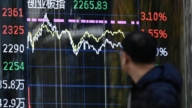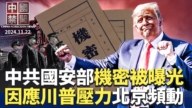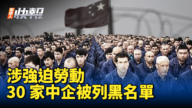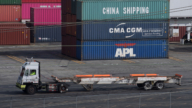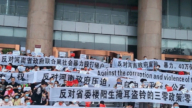【新唐人2013年12月28日讯】日前中共召开农村工作会议,讨论明年的所谓“一号文件”,核心问题是“如何保障粮食安全”。大陆媒体也不再提“十一连增”目标。中共“一号文件”为什么把解决三农问题的战略目标,转移到强调“粮食产量安全”上来呢?请看报导。
中共在12月23号和24号召开了农村工作会议,讨论了明年“一号文件”内容。会议上,中共把粮食产量及质量安全列为重要任务之首。
“中央一号文件”原指中共中央每年发出的第一份文件。现在已经成为中共中央强调农村问题的专有名词。
在这一大前提下,明年的“一号文件”将对小麦、水稻、玉米三大主粮的自给率做出调整,其中正在讨论的三项主要资料是,口粮自给率基本达到100%,谷物自给率基本保持在90%以上,中国粮食总体自给率长期要保持在80%以上。
中共媒体也罕见的不再提粮食“十一年连增”,也不再提“中国能够依靠自己的力量实现粮食基本自给”等宣传口号。
根据《国家粮食安全中长期规划纲要(2008-2020年)》,中国粮食自给率需维持在95%以上。但大陆《经济观察报》引用海关统计资料显示,中国2012年的“粮食进口总量”已达7236万吨,相当于中国全年粮食产量的12.2%。而2013年海关最新资料显示,11月中国进口大豆达到603万吨,创下历年同月最高水准,前11个月累计进口大豆5597万吨,同比增长6.6%。
海关统计还显示,今年10月份的小麦进口量,比上一年同期增长了273.27%,前10个月同比增长16.4%。
大陆《财经》杂志引述研究部门的资料推算,以2010年粮棉油进口量计算,中国进口农产品数量,相当于使用了国外大概7亿多亩耕地,等于整个黑龙江省的面积土地。
中国国家级农业专家吴先生:“这是个社会问题,没有人种地、没有人养牛、都跑到城里打工去了。农村没有人劳动、没有人干活了。”
中国国家级农业专家吴先生表示,中国作为农业大国还缺少粮食,一是因为官商图便宜,大量从美国、巴西等国进口粮食,冲击了粮食价格,打击了农民的种田积极性﹔二是不用科技管理和科技人员把关。农业管理人员腐败无能,他们只考虑钞票,导致农业没有人搞并且失衡。如现在中国传统的特有主粮——小米都成了珍品,老百姓都吃不起了,就是因为管理问题。
吴先生还认为,农村会议不在农村开,也没有农民参加,都是当官的人参加,这哪能保证粮食安全呢!
11月28号,巡回考察山东的中共总书记习近平,在山东农科院座谈会上发表讲话时说,“手中有粮,心中不慌”。他还表示,一旦发生大饥荒,有钱也没用。
而大陆网路盛传,据说是中国“杂交水稻之父”袁隆平吐露真言的网文写道:“中国最大劫难已无法避免”。文章列举了中国粮食危机无法避免、随时爆发的十个理由。
袁隆平指出,尽管中国社会面临很多危机,如政治、经济、信仰、领土、社会等危机,但在有饭吃的情况下,都可以解决﹔一旦老百姓没有饭吃了,或者食物短缺了,那么就会天下大乱,包括政府,都会在食物危机面前荡然无存。
吴先生:“要是出现大饥荒,就要动乱,农民就要造反。历史上农民起义、农民造反都是出现饥荒以后的事情。”
不过,对于“粮荒危机”也有不同的解读。
大陆农业研究人员:“关键是我们是与世界同步还是与世界为敌,我们目前是与世界为敌。如果我们与世界同步、与世界潮流一致,我们可以正常的交易,只要世界整个粮食危机不出现,就不是问题。”
这位不愿透漏姓名的大陆农业研究人员认为,如果中国能与世界接轨,粮荒并不是大问题。
但吴先生指出,“粮荒”对中国是个坏事情,也是个好事情。从好事情来看,就是会倒逼社会改革。
采访/易如 编辑/宋风 后制/孙宁
China’s food supply a serious concern
Recently, the Chinese Communist Party (CCP) held a rural
social work conference to discuss the so-called
No. 1 Document for next year.
The key question is how ensure food security.
Mainland media did not mention the previous objective
of continuously increasing the food supply.
Why did the CCP’s strategic objective of its No. 1 Document
switch from a focus on the Three Agricultural Problems
to place emphasis on the grain production problem?
Let’s look at the reports.
On Dec. 23 and 24, the CCP held a rural social work
conference to discuss the No. 1 Document for next year.
During the meeting, the CCP chose grain output, quality
and safety as the most important tasks.
The No. 1 Central file originally referred
to the first document issued by the CCP each year.
Now the document has become a way for the CCP
to stress rural issues.
Under such a premise, next year’s No. 1 Document
will adjust the self-sufficient rate of wheat, rice and corn.
Three major pieces of data being discussed are basic rations,
which would have a self-sufficiency rate of 100 percent,
cereals, for which the self-sufficiency rate remains above 90
percent, and China’s grain, whereby the overall self-
sufficiency remained above 80 percent for the long-term.
CCP media rarely mentions slogans such as “continuously
increase the food supply in 11 years" nor mentions
“China can rely on itself to achieve food self-sufficiency.”
According to the “national food security and long-term
strategy (2008-2020)", China’s grain self-sufficiency rate
is required to be at least 95 percent.
But Mainland “Economic Observer" news media outlet
quoted customs statistics that claimed that in 2012 China’s
grain imports reached 72.36 million tons which
is equivalent to 12 percent of China’s annual grain output.
The latest customs statistics of 2013 show China’s soybean
imports reached 6 million tons in November,
a record high during the month of November over the years.
The total soybean imports in the first 11 months
were 56 million tons, an increase of 7 percent.
Statistics also show that wheat imports in October of this year
increased 273 percent, a 16 percent increase from last year.
Mainland “Finance" magazine quoted data from the research
department of China’s imported farm products which relayed
that the quantity of grain, cotton and oil imports in 2010
was equivalent to about 700 million mu’s of foreign
cultivated land, which is the size of the entire
Heilongjiang province.
Chinese national agricultural expert Mr. Wu: “This is a social
problem.
Nobody cultivates the land or raises cows;
they all go to work in city.
Nobody labors in the village.”
Chinese national agricultural expert Mr. Wu said there
are two reasons that China lacks in grain production.
The first is that officials and businessmen import from
the United States, Brazil and other countries
at a cheaper price, which has affected farmers’ enthusiasm
for farming.
The second reason according to Mr. Wu is that technology
management and technical personel are not used.
Agricultural managers are corrupt and only consider money,
which has resulted in an agriculture imbalance, he says.
If people can’t afford to eat the unique traditional Chinese
staple – millet – there might be management issues.
Mr. Wu also believes that rural meetings are not held in the
countryside; no farmers attend, only officials are present.
With this, how can food security be guaranteed!
On Nov. 28, general secretary of the CCP Xi Jinping said
during a speech at a forum at the Shandong Academy
of Agricultural Sciences that the “heart
doesn’t panic with food in hand.”
He also said that money is useless once a great famine
takes place.
It is rumored that the “father of hybrid rice" in China,
Yuan Longping, commented on the Internet that China’s
biggest disaster can’t be avoided.
The article cited ten reasons the Chinese food crisis would
not be avoided and could erupt at any time.
Yuan Longping pointed out that although China faces many
social crises, such as politics, economy, religion, and territory,
the food crisis is urgent.
Once people are out of food or short of food, everything will
vanish including government.
Mr Wu: “If any major famine takes place, there would
be unrest and farmers would revolt.
Throughout history, peasant uprisings and revolt all happened
after famine.”
However, the “famine crisis" has a different meaning.
Continental agricultural researcher: “The key is whether
we are with the world or against the world.
We are currently against the world.
If we are with the world, and in line with the global trend,
we can have normal transaction.
As long as there is no food crisis in the world, it is not
a problem for us.”
A Mainland agricultural researcher who wished to remain
anonymous believes that if China can adapt
the international standard, the food crisis won’t
be a big problem.
Mr Wu pointed out that a famine is bad for China, but can
also be used for the good, as it will force social reform.
Interview/YiRu Edit/SongFeng Post-Production/SunNing



